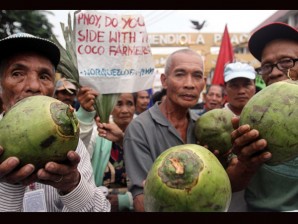Coconut farmers told not to expect cash from coco levy money

COCONUT farmers from Southern Tagalog region walked three days in September to go to Mendiola where they held a rally demanding that the coconut levy be distributed to them. INQUIRER FILE PHOTO
MANILA, Philippines – Coconut farmers should not expect cash doles from the controversial coconut levy fund that the Supreme Court has ruled belongs to the government and should be used for the benefit of the farmers and the struggling coconut industry.
Agriculture Secretary Proceso Alcala said he did not favor any “individual distribution” of money to coconut farmers from the nearly P70-billion fund representing a 24-percent block of San Miguel Corp. shares recovered by the government.
Instead, the recovered assets originating from a coconut levy imposed during the martial law years should be used to develop and modernize the industry in a way that the benefits trickle down to the poorest coconut farmer, he said.
“We develop the industry, not the individual. Because if we make it individual, we won’t ever be able to use the money until Judgment Day’s eve,” Alcala told reporters on Friday.
“I don’t think it’s right to distribute the coco levy fund in the form of cash,” he said. He added that he believed the coco levy fund should not be used either for the government’s conditional cash transfer program, which, he noted, had its own source of money.
Article continues after this advertisementBut Alcala said the final decision still rested on President Benigno Aquino III, who had tapped him to sound out coconut industry leaders and farmer groups on what to do with the coco levy fund.
Article continues after this advertisement“I don’t know if the President will decide to do [individual cash distribution], but even the coconut farmers are not wishing for that,” he said.
Alcala said problems would arise from cash distribution, especially in the identification of the coco levy fund beneficiaries.
“How can you say who’s a legitimate coconut worker and who’s not legitimate? If you say it’s the farmer who’s been tilling the soil, what about the one who owns the land?” he said.
“Once the coconut industry begins to thrive, it will be felt by the coconut farmers. But we cannot identify Juan, Petra or Pedro as the only beneficiaries. If we do that, it will already be Judgment Day’s eve by the time we can use the fund,” Alcala said.
Alcala said that when he accompanied the President in his recent state visits to New Zealand and Australia, he had made it a point to discuss the coco levy issue with Mr. Aquino.
“The President is willing to listen to the coconut industry, which is why my assignment is to have the coconut industry make a proposal, which I will report to him. Then the President will decide,” he said.
Alcala said many people seemed to have arrived at the “wrong interpretation that since the money is here, let’s take this much or that much for our projects.”
“That’s not how it works, because if that were the case, the coconut farmers would all the more not benefit from the fund,” he said.
Alcala said he was in favor of proposals to invest the fund in conservative financial instruments and to use only the yearly interest for programs benefiting the coconut industry.
“Every year, say the interest will be P3 billion, or even if it’s only P2 or P2.5 billion, we will use the interest in a way that will more quickly be felt by the coconut farmers,” he said.
“Imagine spending all the P70 billion in one or two years. How will that be sustainable? It’s very reasonable that only the interest will be used in the meantime,” he said.
As to which government agency will manage the coco levy fund, Alcala said some legal interpretations point to the Philippine Coconut Authority, but this still has to be discussed.
The Supreme Court recently upheld an earlier decision to award to the government the 24-percent chunk of SMC shares, which was part of the 51 percent block of SMC shares that the government sequestered in 1986 on suspicion that they were acquired illegally using proceeds of a tax collected for nine years during the Ferdinand Marcos dictatorship.
In April 2011, another 20 percent chunk of SMC shares valued at P58 billion was awarded by the Supreme Court to Marcos crony Eduardo “Danding” Cojuangco, a cousin of President Aquino’s mother.
Based on estimates by government and other groups, there are some 3.5 million coconut farmers (20 million including their families) who are said to belong to the poorest segment of the Philippine population.